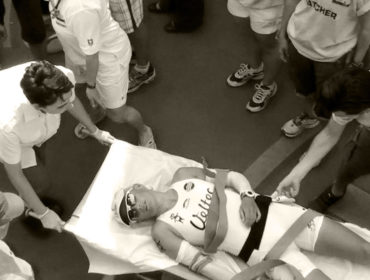Today when we were having breakfast with Chris and the guys at Jamba Juice the topic of vitamin B was raised. Therefore I thought of a short summary about these essential water-soluble vitamins that play important roles in cell metabolism. We know 8 different vitamin Bs. Their roles are manifold. Various enzyme activities depend on vitamin B complex. It influences growth, development, metabolism, the functioning of cells, their regeneration and their turn-over. Immune cells and nerve cells need vitamin B complex.
B vitamins are particularly concentrated in meat, and other good sources are potatoes, bananas, lentils, chili peppers, beans, liver oil, liver, turkey, tuna, yeast, brewer’s yeast, and molasses. Marmite and Vegemite are famous for being one of the world’s richest known sources of vitamin B. As might be expected, due to its high content of brewer’s yeast, non-filtered beer is a source of B vitamins.
Just about everyone in the Western worls already gets all of the B vitamins they could possibly need in their diets… Extra B vitamins are generally just flushed out of the system—although everyone’s limit of absorption is different in regards to B complex vitamins and no-one knows how much is needed on an individual basis of these vitamins…
B vitamins play a supporting role in all organ systems because they are essential for many enzymes to work properly.
- Vitamin B1 (thiamin) and vitamin B2 (riboflavin) help the body produce energy and affect enzymes that influence the muscles, nerves, and heart.
- Vitamin B3 (niacin) has a role in energy production in cells and in maintaining the health of the skin, nervous system, and digestive system.
- Vitamin B5 (pantothenic acid) influences normal growth and development.
- Vitamin B6 (pyridoxine) helps the body break down protein and helps maintain the health of red blood cells, the nervous system, and parts of the immune system.
- Vitamin B7 (biotin) helps break down protein and carbohydrates and helps the body make hormones.
- Vitamin B9 (folic acid) helps the cells in the body make and maintain DNA and is important in the production of red blood cells.
- Vitamin B12 (cobalamin) plays a role in the body’s growth and development. It also has a part in producing blood cells, the functions of the nervous system, and how the body uses folic acid and carbohydrates.
Deficiency of certain B vitamins can cause anemia, tiredness, loss of appetite, abdominal pain, depression, numbness and tingling in the arms and legs, muscle cramps, respiratory infections, hair loss, eczema, poor growth in children, and birth defects in the fetuses of pregnant women.
All B vitamins are water soluble, and are dispersed throughout the body. Most of the B vitamins must be replenished regularly, since any excess is excreted in the urine.
Conclusion: If there is no excessive loss and no deficiency symptoms a healthy diet contains enough vitamin Bs. Moreover it is very important to know that the oral route is always the best way to replenish empty stores of the body.



